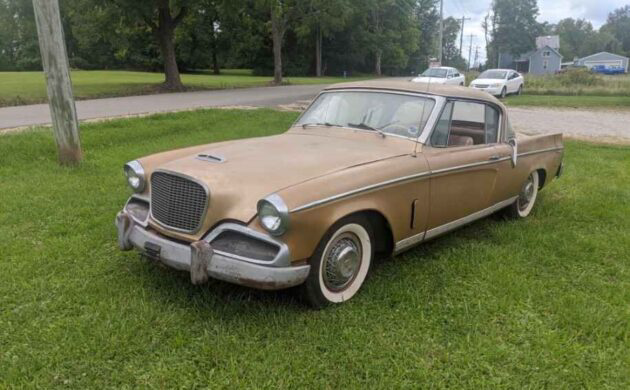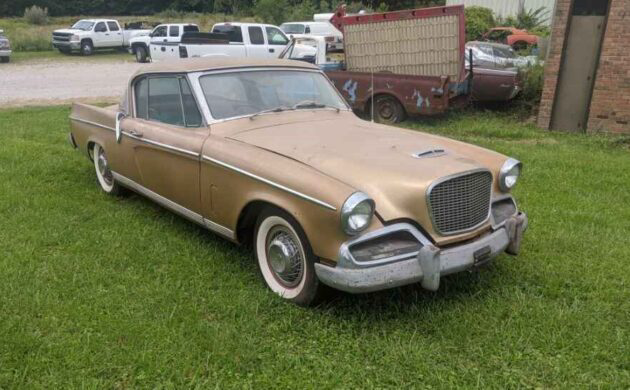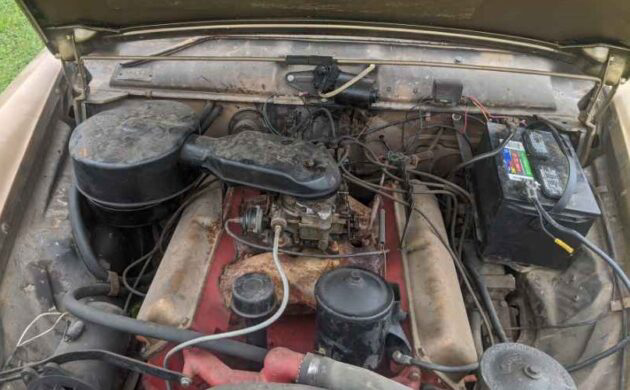Packard V8! 1956 Studebaker Golden Hawk
The 1956 Golden Hawk was one of the many derivatives of the Studebaker Starliner, craftily styled by Raymond Loewy. What set it apart from the other Hawks (that were around through 1964) was that it was the only year that Packard’s 352 cubic inch V8 would be used. After that, they would return to Studebaker power. This Golden Hawk is said to be a nice original car that runs great, but photographs are few to back it up. Located in Galion, Ohio, this product of yesteryear is available here on Facebook Marketplace for $14,000. Thanks for the boss tip, T.J.!
Studebaker and Packard merged in 1954 in hopes that a collective union would keep them viable. But efforts to stave off the grim reaper didn’t help much as the Packard side of the package would be all but gone by 1957-58. One of the first things to go was Packard’s engine plant, which provided the V8 for the first year of the Golden Hawk. That had required Lowey to design a bulky hood to fit the bigger engine under the bonnet. From 1957 forward, the Hawks reverted to Studebaker stock, generally a 289 V8.
In 1956, just over 4,000 Golden Hawks were built, one of the lowest production Studebakers of the year. Those Hawks would be noted for their squared-off egg-crate grilles and vestigial fiberglass tailfins. We’re told this Golden Hawk has a manual transmission and just 53,000 miles, otherwise the only comment made by the seller is that it’s a “nice clean original car.” Perhaps that’s the case and – if true – a Studebaker collector would go into far more detail about the machine. Perhaps it was Dad’s favorite toy and he left it to the kids to do what they will.
Auctions Ending Soon
 2002 Subaru Impreza WRXBid Now10 hours$333
2002 Subaru Impreza WRXBid Now10 hours$333
 1975 Chevrolet Corvette ConvertibleBid Now11 hours$4,000
1975 Chevrolet Corvette ConvertibleBid Now11 hours$4,000
 1964 Ford F-100 Camper CustomBid Now12 hours$2,000
1964 Ford F-100 Camper CustomBid Now12 hours$2,000
 2006 Jeep Wrangler SportBid Now2 days$11,000
2006 Jeep Wrangler SportBid Now2 days$11,000
 1974 Datsun 260ZBid Now4 days$750
1974 Datsun 260ZBid Now4 days$750




Comments
It looks like the hood has been sprung, which leaves me wondering what other structural damage there might be.
The bonnet may have blown open while motoring at speed, as happened to my 1957 Silver Hawk, Twice!
John and SoloSolo,
Typically when a Studebaker hawk hood is repeatedly opened incorrectly, it can lead to structural cracks at the edges of the hood, just forward of where the hinges mount. This hood appears to have that problem, and there is a Studebaker parts supplier who has hood strengthening plates that get welded onto the hood edges to bring it back into the correct form, and help prevent the problem from happening again.
When the hood does fly up at speed, it typically creases the hood all the way across, and almost always requires the hood to be replaced. I don’t see that type of damage.
The important thing all Hawk owners need to know is how to open and close the hood. After unlatching the hood’s secondary safety latch, it’s very important to pull the entire hood forward as you lift upwards. This takes the strain off the hinge points where the side cracks begin. Lowering the hood also requires pulling it forward.
As the latches are a weak point on Hawks, I also suggest using a leather belt buckled around the bumper and thru the grill slats, so if the hood does pop off the latches, it remains closed. Perfect hoods can easily run over $2,500 due to their rarity today, so the belt is cheap insurance!
People love these cars and they were fast I personally didn’t care much for that style. Still might be a fun car to give it a nice tune up and go mess with the teenagers in their fart can imports
I own one of these, and if the seller’s description is correct, it is a very rare car. Mine, like this one purports to be, is one of only 110 built with manual trans and power steering. With it’s stock overdrive and 3.92 rear end, I can tell you it’s a very fast car. The fastest car, in fact, that you could buy in 1956. Faster than the Corvette, T-bird, and even the vaunted Chrysler 300 hemi. Some magazine road tests of the period put zero to 60 times in the low 7 seconds area, and keep in mind the narrow, bias ply tires of the day! Modern fat radial tires just “hook up” and slam you back into the seat. Just amazing performance from a 1956 car. It also had the highest power-to-weight ratio in ‘56. Some specs for you to enjoy:
275 HP, 380 ft/lbs torque. Tachometer, 160 mph speedometer, full gauges including vacuum gauge even! Bullet-proof T-85 transmission, and the whole thing only weighs 3380 lbs.
The giant Packard V8 was designed for the heavy, full-size Packards, and using the muscle-car recipe of “full-size car engine stuffed into a mid-size car for performance” makes this a strong contender for the “first muscle-car” title. It was everything (and more) than the GTO was, and 8 years earlier
Another fun fact… Studebaker engineered a special high-performance package for these cars called the “Jet-Streak” engine: featuring dual quads (from the Packard Caribbean), in addition to a solid-lifter performance cam, special dual-point distributor, and making (at least) 330 HP. Management, at the last minute, decided not to offer it, however, since all the engineering was done, and the part numbers specified, a few of these cars were subsequently modified by dealers with these changes, mine is one of them.
Lucky you to own such a desirable Studebaker Hawk.
What´s the story with the hood? Why take a photo with the hood not closed properly? Something doesn´t add up here, the engine bay is filthy and the motor screams – I have been neglected -. Also the mileage is more than just a little suspect.
The price is only $14500…. geeze
My father had a black 1956 Studebaker Golden Hawk with the packard engine. He bought a Chet Herbert cam, stroked the engine. Ported the heads, found a manifold that used two 4 barrel carburetors. Then he took a Chrysler twin four barrel set up and mounted on the two 4 barrel manifold, balanced the engine and WOW! He mounted two Stude oil bath air cleaners under the hood.He put traction bars on the rear end to keep it from bouncing on launch, used the overdrive feature as a fourth speed. This car was so fast that most racers upon hearing him rev the engine would just back down. He would race anyone, even with the family in the car. One night on the Ventura Freeway he sped up to 110 with the whole family in the car. What great memories I can tell you. He sold the car for 650.00 I wish I had kept the car just for the thrill of speed. The engine had a wonderful, powerful sound. Great car, but the windows were prone to leaking. To buy one of these from the rust belt is very risky. Why would someone show this car with the hood up??? Something is going on here. Finding parts might also be a problem.
Walter,
Mechanical parts are not difficult to find, and most of the body parts that rust are available as patch panels. Interiors are reproduced, same with most of the Hawk and Golden Hawk trim pieces, weatherstrips, etc.
Walter,
Mechanical parts are not difficult to find, and most of the body parts that rust are available as patch panels. Interiors are reproduced, same with most of the Hawk and Golden Hawk trim pieces, weatherstrips, etc.
I had a 1956 Silver Hawk and from what I remember the hood latch was something to be desired as it would release and allow the hood to fly up and block your view of the road. I had this happen once and it’s a little unnerving when you are flying down a two lane highway at 75 MPH.
Some interior photos would be nice…
Looks like the front bumper was painted with silver paint.
As Kenny mentioned, these cars, when equipped with overdrive were very fast, especially when the driver knows how to shift the car using the overdrive in all 3 forward gears. When I had my overdrive equipped Hawk, I used to love passing other older ‘hopped up’ cars, and watch the owners jaw drop when I would shift out of second overdrive into third at well over 60mph!
While the ad does not mention overdrive, I see what I believe is the overdrive relay on the upper part of the firewall in front of the driver. So Kenny is correct, it’s a rare and fast car.
Here’s what the Studebaker Museum in South Bend, Indiana, has to say about the ’56 Golden Hawk: “The Golden Hawk was Studebaker’s flagship model in 1956. It featured Packard’s 275-horsepower 352 cubic-inch V8 engine and was one of the fastest cars on the road that year. The 1956 Golden Hawk was the first Studebaker automobile to feature tail fins. The ‘56 Golden Hawk’s fins were made of fiberglass, while ‘57 and later Hawk fins were steel.”
While many people like to claim the Pontiac GTO was the first American muscle car [defined as a large V8 engine in a mid-sized car], it was actually the ’56 Golden Hawk.
Bill
All factory stick shift 56J had overdrive. It was the T85 a heavy duty transmission.
Vince, Thanks for the info, ‘nuttin better in the way of a 3-speed stick, than when its got overdrive.
treat – a GH AND an Avanti on same screen